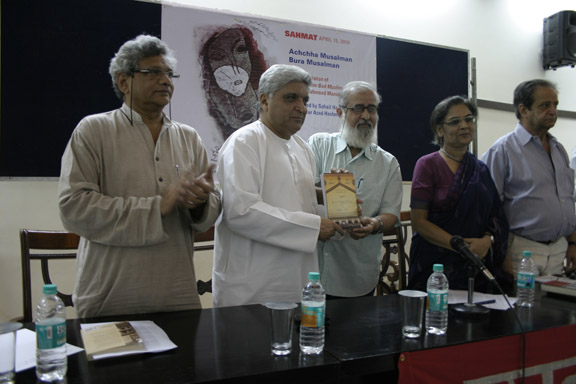at the release by poet Javed Akhtar of
Achchha Musalman Bura Musalman
the Urdu Translation of Good Muslim Bad Muslim By Prof Mahmood Mamdani
A seminal work about America, the Cold War and the Roots of Terror.
Translated by Sohail Hashmi and Qamar Azad Hashmi
Chair: Professor Mushirul Hasan
Thursday, the 15th of April at 5.30 pm
at the Deputy Speaker’s Hall, Constitution Club,
Vithal Bhai Patel House, Rafi Marg, New Delhi 110001
The Hindu Coverage
Some six years ago Mahmood Mamdani, Professor of Government in the Departments of Anthropology and Political Science at Columbia University in the U.S., wrote a book called “Good Muslims Bad Muslims: America, the Cold War and the Roots of Terror”. The well-received book also brought brickbats for the author, for it made a powerful statement that indicated that the so-called “bad Muslims” were actually once “good Muslims.” And that this entire enterprise is less about religion or Islam, more about American power politics — that has corrupted not only the American government and American ideals but also Muslims in the Middle East.
Already translated into Hindi, the book has been translated into Urdu by Qamar Azad Hashmi, the assassinated theatre personality Safdar Hashmi's 86-year-old mother and his brother Sohail Hashmi. The book was released by poet Javed Akhtar at the Constitutional Club this week in the presence of Sitaram Yechury, professors Aijaz Ahmad and Zoya Hasan and theatre director M.K. Raina.
Why translate the book into Urdu six years after it was printed? Reasons Sohail, “Because those people, especially Muslims who know only Urdu and are caught in the quagmire of what and who is a good and bad Muslim, need to know who created this entire concept and why.”
A hate campaign
In a heady discussion, the think-tank present gave their take on the book. Raina, who convened the meeting, admitted he hadn't read the whole book but from whatever he read he was shocked to see “how faceless criminals were brought into the Taliban army”. Columnist Zafar Agha threw light on what the book is all about. He said, “The book was understood as explaining only civilizational conflict. But it attempts to differentiate between illiterate and literate Muslims. And it is not about a clash of civilization but the sheer politics that spearheaded a movement of hatred against Muslims and Islam. The word ‘Jehad' didn't exist in the Muslim dictionary before US intervened. The book is honest and clinical in its approach.”
Meanwhile, Raina shared that Hashmi family's social justice organisation, SAHMAT, which has published the Urdu version, is taking the book to Pakistan “to avoid confusion of people about good and bad jehadis,” said Raina, who is taking the book to Jammu and Kashmir for the Urdu readers.
Professor Aijaz said that the book is still relevant after 9/11 and the invasion on Iraq. Javed Akhtar took the conversation to a different level. He justified it with one sher by Majaz, “ Kuch tumhari nigah kaafir thi, kuch mujhe bhi kharab hona tha', adding, “Why has there been no voice of dissent from any reputed organisation representing Muslims when the Taliban was getting formed? Why do we not fight the villains within the country?” Zoya Hasan, who chaired the meeting, concluded by saying the book provides a conceptual foundation of American strategic policy.
